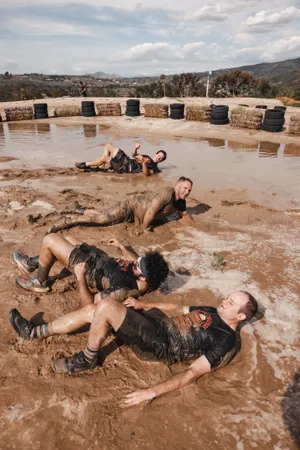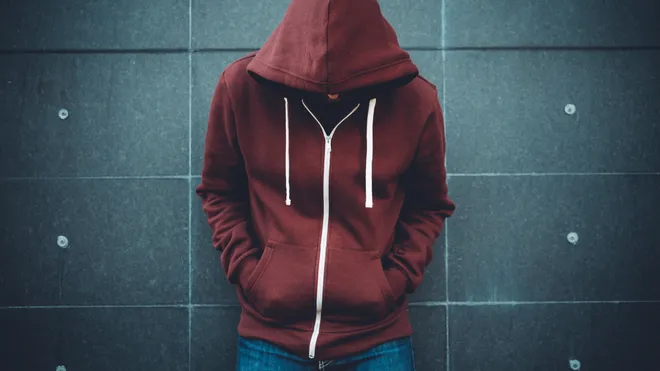Men are going to brutal boot camps to reclaim their masculinity. How did we get here?
They crawl slowly up a hill on their stomachs, covered in grime. One man moans after an instructor yanks him by the ankles back down the hill. Still, he keeps crawling.
One man lies on his back while an instructor sprays hose water in his face. Another, wearing big chains across his torso, shivers during an expletive-laden rant from a bearded man, who calls him a disappointment.
These men aren't prepping for an elite military mission.
They're trying to become better men, they say.
"Man camps," or all-male experiences designed for men's self-improvement, have gained attention on social media, where more extreme versions of these programs, such as the Modern Day Knight Project in Southern California, share videos of the treatment participants endure, often to the tune of hundreds of thousands of views.
Though men's psychology experts are skeptical of the extreme iterations of man camps, they say the growing awareness of them points to a loneliness and need for community men face in modern society.
"Men are seeking out difficult experiences," says Erik Anderson, a licensed marriage and family therapist. "They're seeking out groups. They're seeking out tribes. They're seeking out some sort of social bonding and sense of social capital. And they're turning to these groups that, to me, feel like they're giving people a bit of a false sense of that."
What are 'man camps' − and why are they getting attention?
There are many different kinds of man camps. Some function like group therapy, some like workout classes, others are boot camp-style trainings.
The Modern Day Knight Project, also known as "the Project," falls into the last category.
Billed online as a "75-hour crucible," the experience involves grueling physical challenges under the instruction of military veterans. Those who make it through get access to a year-long coaching and mentorship program called the Modern Day Knight Mastermind Program. It costs $18,000 to attempt.
The Project's goals, per its website, are to get men to shatter their self-doubt, see their purpose clearly, heal their trauma and uncover what's holding them back. USA TODAY's interview request for Bedros Keuilian, the founder of the project, went unanswered.
Ronald Levant, professor emeritus of psychology at The University of Akron and co-author of "The Tough Standard: The Hard Truths about Masculinity and Violence," says extreme man camps like the Modern Day Knight Project sell men on the idea that if they adhere to a hardened vision of masculinity, their lives will improve.
"They feel that their lives are not what they want them to be, and they believe that if they were more masculine, more macho, more 'beast,' their lives would be better," Levant says. But that's rarely the case, he says.
Jimmy Rex, founder of the men's community We Are The They, signed up for the Project in 2022 for fun.
About six hours in, he says, the instructors had participants stand and share their reasons for being there. One man said he cheated on his spouse and wanted to become a better man. Another said his wife was cheating on him and he wanted to get his family back. Another said he'd served a years-long prison sentence and wanted to prove he was a new person.
Though he passed the fitness test to qualify, Rex said he felt unprepared for the intensity of the program. His left knee popped during a hike a couple hours into it, and he quit shortly after. He said his knee still bothers him.

Overall, he views his man camp experience positively and says the program he did accomplishes what it sets out to do. Rex held a similar event called the Misogi Challenge with his organization, which involved 12 hours of grueling physical tasks.
"They show the videos of what it is. They're not hiding, making it seem like it's something it's not," Rex says of the Project. "If it's not for you, it's not for you. But people willingly go to do it. They know what they're signing up for."
Why are men doing this?
Though psychologists aren't sold on boot camps as a solution, they say the prevalence of man camps in general points to a real problem men are facing: loneliness.
In a 2021 survey by the Survey Center on American Life, only 21% of men said they received emotional support from a friend within the past week, compared to 41% of women. Just 25% of men said they told a friend they loved them within the past week, as opposed to 49% of women.
"A lot of men are lonely because they lack the ability to put emotions into words, which makes it hard for them to form relationships," Levant says. "The inability to put their emotions into words leads to failures in relationships, leads to loneliness, leads to their seeking out these experiences."

Man camps offer an opportunity for men to bond with other men − and that isn't necessarily a bad thing, especially when these programs make mental health a priority.
One such program is MPowered Brotherhood in Austin, Texas, which offers weekly workouts and other events for men. In addition to helping men improve their physical fitness, Stefanos Sifandos, a founder of MPowered Brotherhood, says the organization incorporates emotional practices, vulnerability exercises, breathwork, grief circles and more.
He says it strives to give men a support network and show them they're worth more than their achievements and accolades.
"It's an opportunity to be more of themselves without judgment, without shame," Sifandos says. "We really meet each other with compassion and non-judgment and in healthy ways."
More:Lloyd Austin didn’t want to share his prostate cancer struggle. Many men feel similarly.
MPowered also offers an intense boot camp called "Activate Your Alpha," but Sifandos says it approaches what it means to be an "alpha" from a "holistic" perspective. The boot camp includes exercises around relationships and trauma, and participants receive 24/7 access to professional mental health support during, as well as before and after, the camp, which Sifandos says is key.
"There has to be deep emotional and psychological work that goes with it," he says. "Otherwise, it just becomes an exercise in mental fortitude, which only gets you so far."
Overall, Anderson says man camps show society needs to do more to address men's emotional and mental health. Levant adds that, when men give voice to their feelings, their relationships tend to improve.
"We need to have a broader conversation about men's need for belonging in our society and have other rituals that provide some way of satisfying that men's need for belonging, that men's need for trial, the men's need for tribe," Anderson says.
Boys and men are lonelier than ever.What can we do about it?
Disclaimer: The copyright of this article belongs to the original author. Reposting this article is solely for the purpose of information dissemination and does not constitute any investment advice. If there is any infringement, please contact us immediately. We will make corrections or deletions as necessary. Thank you.







